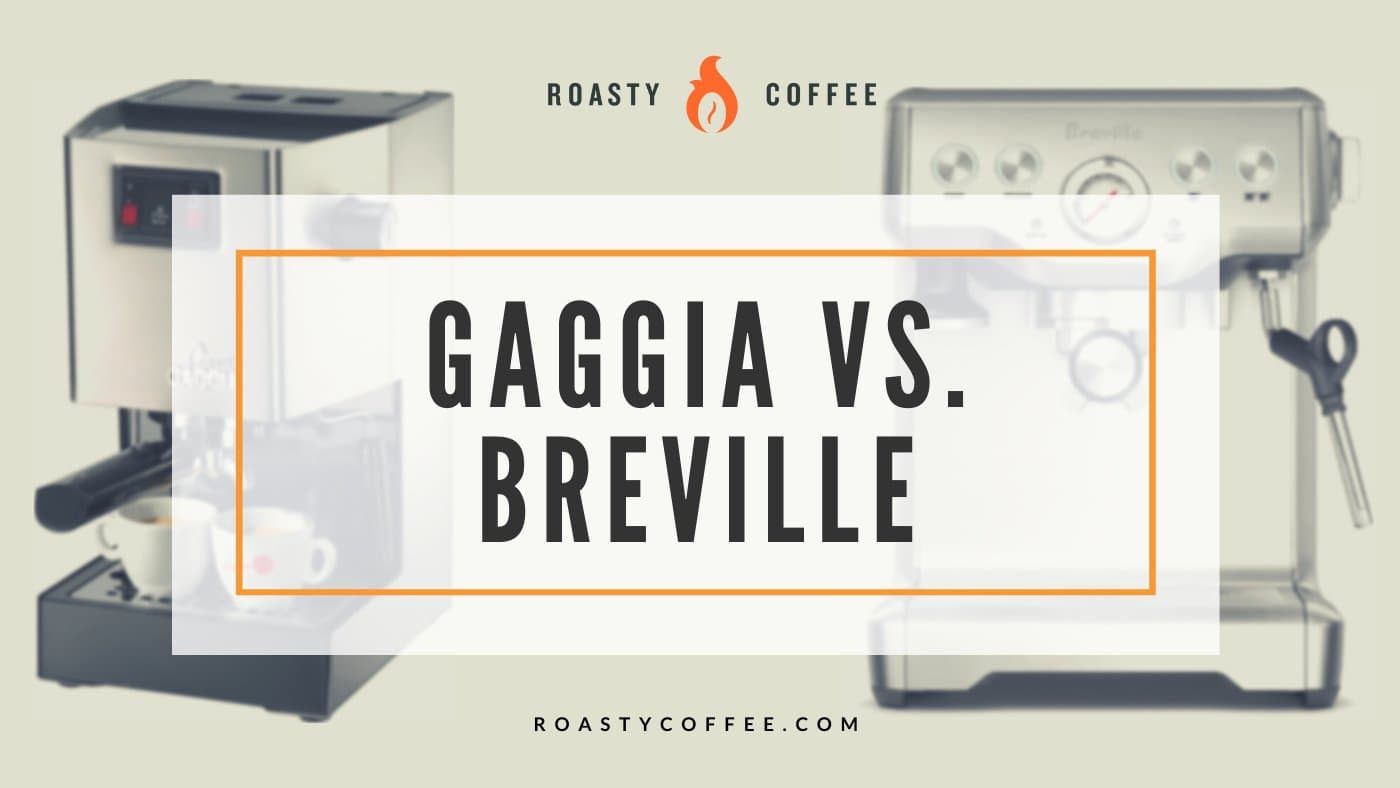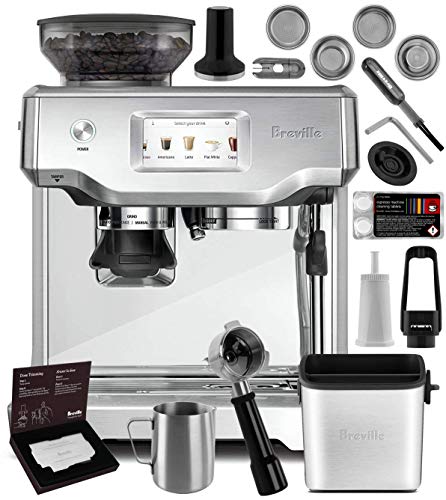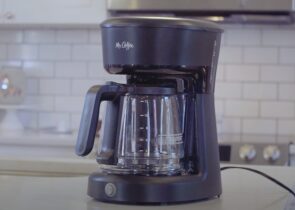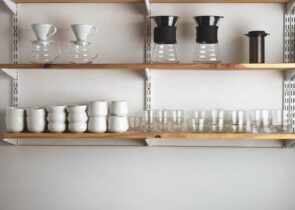Bringing your passion for perfect espresso to your kitchen requires a top-notch machine. As you scour the espresso machine market for a bang-up brewer, you’ll undoubtedly stumble across the names Gaggia and Breville.
Both brands are known for producing espresso machines that brew barista-quality espresso shots. But which is best? Which one deserves a coveted spot on your kitchen counter? Only you can decide that, but hopefully, our comparison of Gaggia versus Breville below will help make your choice a bit easier.

Gaga for Gaggia
Much to the delight of dedicated espresso lovers, Giovanni Achille Gaggia patented the original, modern steamless espresso machine in 1938.
When his company, Gaggia, officially launched in 1947, its brewers pretty much changed the game when it came to espresso. Gaggia’s machines are largely responsible for the prestige associated with the crema sitting atop a good shot of espresso.
When the Saeco International Group purchased Gaggia in 1999, the brand upgraded to stainless steel boilers, and it continues to produce some of the best espresso machines available today.
While most of Gaggia’s coffee and espresso machines come from Milan, the company’s most popular espresso machine, the Gaggia Classic, is produced in Romania.
Oh, Baby, it’s Breville
In the Land Down Under, “Breville” is to kitchen products as “Kleenex” is to tissues in the United States. The Australian brand, founded in 1932, has been at the forefront of innovation for over 85 years now and is known to have some of the best customer-company communication around.
Breville got its start by making radios during World War II. When the war came to a close, the company shifted its focus to kitchen appliances, with its big break coming in the form of a revolutionary sandwich toaster.
In 2001, Breville broke into the espresso machine game and has been producing some of the most sought-after brewers ever since. Breville Group has bases in Canada, Hong Kong, New Zealand, and the United States. Several of the company’s espresso machines are produced in China and distributed elsewhere, but their quality is still top-notch.
Battle of the Brands: A Top Picks Showdown
We generally recommend semi-automatic espresso machines, regardless of the brand you’re buying from, because they offer a nice mix of convenience and flexibility and borrow the best features of their manual and fully automatic counterparts.
However, some people want the brewing process to be as simple as pressing a button and letting a machine do the rest of the work. So, keep reading while we compare a couple of Gaggia and Breville’s super-automatic machines, too.
For a slight summary of all the machines we’ll talk about, we’ve condensed a lot of the information into this comparison table:
| Gaggia Classic Pro | Breville Barista Express | Gaggia Classic | Breville Infuser | Gaggia Anima Prestige | Breville Barista Touch | |
|---|---|---|---|---|---|---|
| Dimensions | 8"D x 9.5"W x 14.2"H | 12"D x 11"W x 13.5"H | 9.5 x 8 x 14.2 inches | 12.3" x 10.1" x 13.1" | 8.7"D x 16.93"W x 13.38"H | 12.7"D x 15.5"W x 16"H |
| Weight | 18.7 pounds | 23 pounds | 20 pounds | 17 pounds | 16 pounds | 26.8 pounds |
| Power | 1425 watts | 1600 watts | 1450 watts | 1650 watts | 1500 watts | 1680 watts |
| Water Tank Capacity | 72 oz | 67 oz | 71 oz | 61 oz | 61 oz | 67 oz |
| Steam Wand | Yes | Yes | Yes | Yes | Automatic milk frother | Yes |
| Bar Pump System | 15 Bar | 15 Bar | 15 Bar | 15 Bar | 15 Bar | 15 Bar |
Semi-Automatic Espresso Machines: Gaggia Classic Pro vs. Breville Barista Express
The Gaggia Classic Pro and Breville Barista Express are two of the best machines available, so rest assured you’re getting a great product, whichever you choose. We’ll dig into what sets these brewers apart, but first, let’s take a look at a few of the key features they share:
- Built-in water tank
- Included tamper
- Commercial steaming wand (This is great news — commercial-style steam wands are usually a good indicator of high-quality machines. They’re also better for latte art than Panarello steam wands are.)
- Hot water dispenser (Use this to warm your cup or get hot water for tea, soup, or a classic Americano.)
- Optimal pump pressure and quick heat-up
Now, let’s move on to how these coffee machines differ.
Gaggia Classic Pro Semi-Automatic Espresso Maker
The Gaggia Classic Pro is possibly the best espresso machine for first-time buyers. It’s incredibly user-friendly, and you can pair it with your favorite grounds or easy-serve espresso (ESE) pods. It doesn’t have a built-in coffee grinder as its Breville competitor does, so if you don’t use ESE pods, you’ll either have to settle for pre-ground coffee or purchase a separate grinder.
The Classic Pro’s commercial steam wand gives you absolute control of the milk frothing process, and the system’s quick heat-up feature gets the boiler brew-ready in just five minutes or so.
There are also superior pump mounts that keep the machine’s whirs and rumbles to a minimum, so you don’t have to worry about waking the whole house during your early morning brewing sessions.
This compact espresso machine also has a commercial Three-Way Solenoid Valve that takes the pressure off of the ground beans and leaves you with a dry, easily discardable puck and an updated control panel that’s split into three switches: power, brewing, and steaming.
Each of these switches even has an indicator light that lets you know when your machine is powered on, ready to brew a single or double-shot espresso or steam your milk of choice.
We also applaud the Classic Pro’s sleek and modern design. It’s a step up from its predecessor, the Gaggia Classic, and its redesigned frame doesn’t just give it a sharper look; it also provides easy access to the 72-ounce water tank.
Breville BES870XL Barista Express Espresso Machine
Breville’s Barista Express is one of our all-time favorite espresso machines. It’s a semi-automatic brewer, but it has several programmable features that give it the luxurious feel of a super-auto.
It’s called the Barista Express because it’s got everything any budding barista could want, including digital water temperature control (that makes for a pretty precise extraction process) and a bean hopper for storing coffee beans until they’re ready to be ground.
Those aren’t all of the Barista Express’s features, though. There’s also a built-in stainless steel conical burr grinder, complete with a wide range of programmability options from which to choose. No matter what grind size you need, this baby can get the job done.
This brewing unit is a relatively compact size, so you don’t have to worry about it taking up too much space if you don’t have a lot of it to spare. If you’re among the many espresso drinkers who live in a small dorm room or apartment, you may want to keep this machine near the top of your coffee equipment wish list.
Chances are, you’ll find glowing reviews anytime you research this machine, but it does have one significant drawback: its less-than-affordable price. But with details like a Clean-Me light and super quick 20 to 30-second startup, you can’t complain.
Compare the Barista Express to Classic Pro, and you’ll see that Gaggia’s offering has a larger water tank. However, many espresso experts think the Breville brewer’s built-in grinder makes up for its smaller reservoir.
Semi-Automatic Espresso Machines: Gaggia Classic vs. Breville Infuser
A couple more options for semi-automatic espresso machines are the Gaggia Classic and the Breville Infuser. Both of these brewers are on the slightly more compact side to save on counter space and make things just a little less complicated.
Some of their other similar features include:
- 15-bar pump system
- Stainless steel boiler
- Manual milk steam wand
- High-quality portafilter included
However, these machines are also very different in comparison. So, let’s look at what sets them apart.
Gaggia Classic Semi-Automatic Espresso Machine
The Gaggia Classic espresso machine is a variation introduced in 2015, taking on a lot of changes from its original model which was made in 1991. Made in Romania, the Gaggia Classic featured a stainless steel boiler and exterior plastic components.
With a Panarello wand to steam milk, a high-quality portafilter, a 71-ounce water reservoir, and a boiler that’s less susceptible to corrosion, this machine is a compact and timeless brewer. While it’s been known to be a machine that is slower to heat up, there’s no denying the delicious espresso it can produce.
It’s not available everywhere and therefore comes at a bit of a higher price point than the next machine, but that also just means it’s slightly harder to find the Gaggia Classic compared to the Gaggia Classic Pro.
Breville Infuser BES840XL Semi-Automatic Espresso Machine
Comparatively, the Breville Infuser BES840XL is a machine that gives home baristas a hands-on experience. There are several features on this stainless steel design that truly set it apart from the Gaggia Classic, though its water tank is slightly smaller, sitting at 61 ounces.
The Breville Infuser has a handy removable magnetic tamper, a Thermocoil Heating System and PID Temperature Control to give you more extraction control and consistent water temperature, a water dispenser, an auto-purge function, volumetric control, and an easy-to-use control panel.
That being said, it is noted that the Breville Infuser can be a bit harder to clean. However, instructions are included for this and compared to all of its great features, the trouble just might be worth it! The price is lower than the Gaggia Classic, but it’s truly about what you value in an espresso machine.
Super-Automatic Espresso Machines: Gaggia Anima Prestige vs. Breville Barista Touch
Anyone searching for ultimate convenience and minimal effort would likely be happiest with something super-automatic. Fortunately, Gaggia and Breville are frontrunners in this facet of espresso machine manufacturing, too.
Though both of these machines have higher price points, they tend to pay for themselves in a few short months, especially if you were paying five dollars for a cup of coffee from the local café every day before having a brewer of your own.
Plus, keeping one of these bad boys on your countertop means you won’t even have to get out of your pajamas to get quality coffee. If that doesn’t make the investment worth it, we don’t know what does!
Consider these machines’ shared features as you read on:
- High-quality milk frothers
- Built-in grinders
- Sleek LCDs
- Standard super-automatic operation (In other words, press a button and get a hot drink; it’s as simple as that.)
- Good water pressure, materials, and temperature options
Gaggia RI8762 Anima Prestige Automatic Espresso Machine
No products found.
Gaggia’s Anima Prestige has a simple interface with an LCD screen and six buttons that help you brew delicious-tasting espresso every time, whether you want to enjoy a plain old shot of espresso or plan on whipping up a creamy latte.
A second look at the rest of this machine’s incredible features reveals that the Anima Prestige makes brewing at home almost as easy as ordering your go-to drink from a barista.
Break out a bag of pre-ground or whole bean coffee — it’s your choice, thanks to the bypass doser and built-in burr grinder — to make your morning cup. Just don’t forget to take advantage of the pre-infusion function to moisturize the coffee grounds before brewing them.
The Gaggia brewer’s additional features include three adjustable temperature settings (your drink will be just right every time), a removable milk carafe, a bean hopper, a low-energy standby mode, and a 60-ounce removable water tank that makes refilling the machine a mess-free process.
The machine’s standout feature, though, is the Gaggia Adapting System that allows the brew unit to learn your preferences, adjusting how the integrated grinder works to accommodate your coffee of choice.
Unfortunately, when it comes to espresso machines, not even the most advanced models are perfect, and the Anima Prestige isn’t either. However, most espresso drinkers’ problems with this product aren’t even related to the machine itself.
Instead, it’s the customer service and malfunctioning machine repair process that are unsatisfying. With a two-year warranty, though, you’ll likely be able to catch and correct any weird system bugs before things get too out of hand.
Breville Barista Touch BES880BSS Espresso Machine
Only one word can accurately describe this Breville Barista Touch: luxurious. The espresso brewer beautifully blends the tropes of super-automatic machinery with the expansive flexibility usually available only with semi-automatic espresso machines.
Breville products’ accessibility shines with this model, from the step-by-step instructions that show up on the intuitive touch screen to the personalized coffee settings that allow you to save up to eight different drinks.
Because the machine learns your preferences, you’ll never again have to settle for less-than-perfect espresso in the morning. Learning to use the Barista Touch is fun and easy, and the automatic steam wand and integrated grinder keep you from spending the extra bucks on separate tools.
Unfortunately, this machine doesn’t have an auto coffee tamper as the more expensive Breville Oracle does, but everything else is hardly short of breathtaking, especially for a super-automatic brewer.
Which One is Better?
Now, for the moment of truth: the verdict. Which brand boasts a better range of products, Gaggia or Breville? At the end of the day, opting to brew coffee with a machine from either brand won’t steer you wrong.
Gaggia and Breville both prioritize ease of use and the production of high-quality espresso shots. Plus, they make coffee preparation fun!
That said, we at Roasty think Breville’s machines slightly edge out Gaggia’s offerings. It’s pretty clear that Breville considers every bit of feedback from their customers and that dedication shows in the details of their machines.
Happy Caffeinating!












